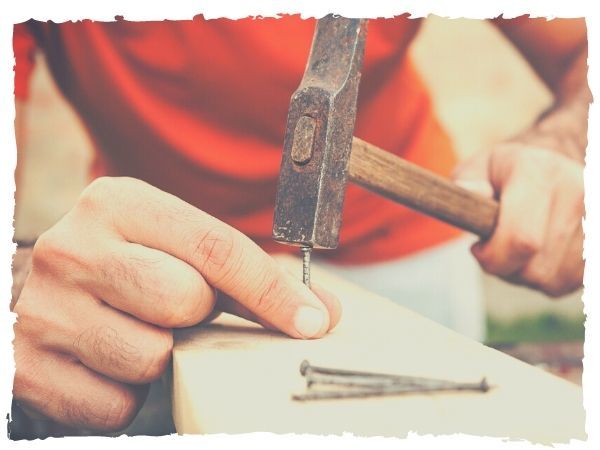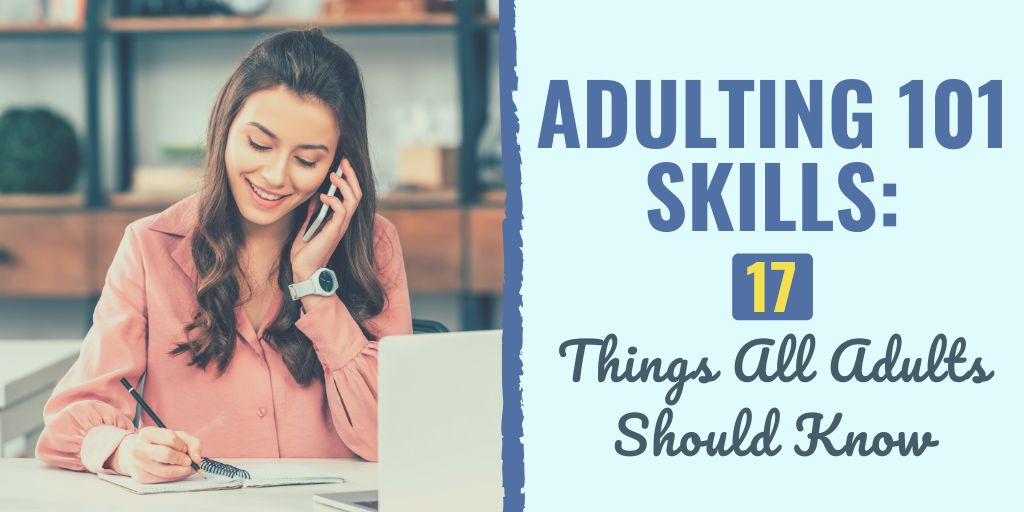Hi! It’s me.
I’m you… Let’s say it was 20 years ago, give or take.
I was where you are at this very moment… about to fly the coop and make a life for myself, on my own. No parents.
I’m not talking about going to college for the first time, but about getting my own place to live.
Starting or finding a job.
Managing my finances.
Taking care of everyday stuff on my own… like a grown-up.
Today's kids refer to this as “adulting.” Believe it or not, there are even classes and books on this topic.
But these things typically cost money.
And you need to start saving money (if you haven’t done so already).
So, consider this your lucky day! I’m willing to share my own version of Adulting 101 with you… free of charge.
There will be tips, tricks, and advice based on my firsthand experience. I’ve even broken it into sections to make it easier to find what you need.
All you have to do is keep reading.
A. Financial Know-How
Financial savvy is a key component in Adulting 101.
Hopefully, your parents or a teacher went over the basics of saving, spending, budgeting, and balancing a checkbook.
But if not, never fear… I’ll walk you through it.
1. Open A Checking Account and Get One Credit Card
Every person venturing out on their own needs two things to get started… a checking account and a credit card.
The bank account is where you’ll keep your money and pay bills. It will control your budget. It’s the center of everything.
You may not write many paper checks, as you’ll likely use the debit card in most instances, but you still need a routing and account number for automatic payments.
Payments such as student loans and credit cards… bring me to the next item.
You need to apply for and obtain one credit card.
Businesses such as hotels, car rental agencies, and restaurants often require credit cards to hold reservations. A debit card will not always do so unless it has a MasterCard or Visa logo.
There are a few good credit cards out there designed to help you build credit when you’re just starting out. The limits are lower, and some even offer rewards.
I suggest starting out with only one so you don't get into trouble with overspending. You should also try to pay the full statement balance each month to avoid unnecessary interest charges.
2. Budgeting and Debt Consolidation
Now that you’ve set up your accounts, you must fund them adequately. This means creating a budget to help you curb spending and put some money into savings.
At this point in your life, you’ve likely held at least one job… maybe more. And you’ve probably gotten money for birthdays, holidays, and other big moments.
Hopefully, you (or your folks) will put some of that money away to help you start down the road to independence.
Once you know how much money you have to work with, you need to make a list of your monthly expenses, such as student loans, transportation, groceries, rent, etc….
Afterward, you can start making a list of extras… like going out with friends, ordering takeout, or buying new shoes. Then, set aside how much money you’ll give yourself each month for these things.
Lastly, decide how much money you want to keep untouched in your savings. This could be an emergency or rainy-day fund, money saved for a trip, or a new car.
Whatever you want to save for is your business, but I highly suggest having at least one month’s cushion saved up… just in case something happens.
Things happen.
There are some terrific money-saving apps that make budgeting and saving a cinch, so you don’t have to think about it too much.
You also want to review your debt (e.g., government or bank loans and credit cards) to try to consolidate it or negotiate lower interest rates… putting more money in your pocket each month.
==>22 Free Budget Printables to Track Your Family’s Expenses
3. Financial Planning & Taxes
Now that you’re working, you may have work-related expenses. Items such as:
Whether you are working in an office or remotely, you are entitled to deduct a portion of work-related expenses from your income.
Did you know that?
And did you also know that any interest paid on student loans is an eligible tax deduction of up to $2,500 each year?
Money savings tips like these are best obtained by utilizing an accountant or enrolled agent to help you prepare and file your taxes each year.
If you’re getting a 1099 or W-2 for work and are over 19 years of age… you will need to file taxes. Some couples are still able to claim their child up to age 24 as a dependent on their taxes, but only if the child is a full-time student.
So if you’re over 24 and finished with school, you’ll need to take care of this adulting 101 step yourself.
If you feel as if things are pretty simple, you can always try online filing. You’ll need to purchase the software or license agreement, but it can be done from your computer or smartphone… which is convenient.
It’s also not a bad idea to seek out “one-stop shops” that offer both accounting and future planning advice from a fiduciary financial advisor.
FFAs can invest your money for you, as conservatively or aggressively as you’d like. They are held to very high standards to ensure your investments hit certain benchmarks. They are fee-based rather than commission-driven.
They can also guide you on retirement and health savings plans (IRA, 401K, HSA).
Suppose you have no clue what these things are. In that case, it’s probably a good idea to find a financial advisor with a fiduciary responsibility to provide advice… because it’s never too early to start dreaming about life after retirement.
==>Setting SMART Personal Financial Goals
4. Big Ticket Purchase (Or Lease)
Before you can fly free from your parents’ nest, you’ll need to find a place to live.
Whether you choose to live with a roommate or go it alone, you’ll first need to decide what you can afford.
Then, you’ll need to consider logistics, such as proximity to work or school… and the surrounding area's social characteristics.
Maybe you would prefer your place to be within walking distance of a lively downtown scene, or perhaps you’d prefer peace and quiet most of the time.
You also need to figure out whether this is going to be a short-term or long-term move. If you’re only looking at four years of grad school, for instance, you probably want to rent rather than buy a place… since you don’t yet have a clue where you’ll land a job.
But if you’re vying for a Partner in a law firm, you’ll likely put in the time…working late hours. So, purchasing your first home may be the way to go… especially if it has good resale potential.
It’s also okay to consider what’s important to you. For example, property amenities and tenant demographics can mean a lot to someone just starting out.
Figuring out what would make you happy will also dictate how much you’ll need to spend to get it. Thus, you may need a roommate.
Living arrangements aside, adulting 101 presents a handful of big-ticket purchase or lease opportunities as time unfolds.
Do you need a car to get to work? Or will public transportation and UBER suffice? Maybe biking? Electric bikes have grown in popularity, especially in cities.
All of these things are food for thought when you’re adulting.
5. Purchasing Insurance
There are many types of insurance, but the most common to think about in Adulting 101 are:
If you’re going to live on your own, whether renting or buying, you need to protect your home and its contents.
You’ve likely spent years collecting or purchasing items. And, yes, that includes video game consoles and all that goes with it… as well as DVDs and comics.
This insurance also typically covers accidental damage to the property and injuries that someone might suffer at your place.
The same goes for auto insurance. The law requires all drivers to have insurance, which covers you and your vehicle… and anyone you may accidentally hurt while driving. It usually comes with some medical insurance as well, should you wind up needing treatment or being hospitalized.
Unlike renters insurance, which tends to be fairly inexpensive, automobiles can get quite pricey. It depends on whether or not the car is new. In those cases, the bank requires full coverage whether you are leasing or purchasing the vehicle. Conversely, if you’re driving around a beater, you paid $1500 for… you can skate away with minimal coverage.
You should shop around for the best rates based on your driving record.
Moving on… no, that is not a typo.
Pet insurance is a thing. And it’s a big one to consider.
Let’s be honest.
Your pet is a huge part of your life… especially now that it’s just you.
And a pet’s medical expenses can be huge.
Trust me.
I’ve known people who took out loans to pay for their dog’s cancer treatments.
But catastrophic incidents aside, pets get into things. They are curious by nature… much like kids. They may eat something terrible for them, catch a cold or get hit by a car and break their leg.
As they get older, their joints and eyes will start to go. They may have stomach issues.
And every time you take them to the doctor, you’re likely looking at paying $150 minimum.
Then there are medications and vaccinations.
Pet insurance costs next to nothing and is well worth its weight in gold, with some companies offering policies starting as low as $10 per month.
That’s about how much a glass of wine costs at a nice restaurant.
B. Domestic Responsibilities
This section could have also been called “things I should have learned as a teenager”.
If you were fortunate to grow up with parents, grandparents, older siblings, aunts or uncles, or even a neighbor who took the time to assign chores or spend time teaching you things… you’re already ahead of the game when running a household.
While you may not have realized or appreciated it at the time… they were doing you a big favor.
When you are living alone, you may not have the luxury of calling someone to come over and fix a clogged drain or change a fuse immediately.
And why would you want to pay someone for minor fixes? It’s a waste of money, a big no-no in adulting 101.
So here is what you need to know, if you don’t already, about taking care of your house.
6. Minor Home Repairs
If you are renting a place for the first time, chances are there is a building supervisor or maintenance person whose job it is to take care of minor home repairs. And if they can’t do something, they will contract it out to someone who can… at the building owner’s expense.
That said, if you rent a house from an elderly woman… simple fixes may not be your forte and can take a while to schedule. As a bonus, if you offer to take care of some minor home repairs yourself, landlords will sometimes give you a discount on rent.
Score!
Now, if you’re a first-time homeowner… the responsibilities fall solely on you to take care of repairs. Lucky for you, they don’t all require a professional to complete. By doing minor repairs yourself, you’ll save money and make your parents proud!
Here are the 11 most common lists of minor fixes in the home:
These are all super easy and inexpensive fixes. Most will likely take you less than 1 hour to do yourself.
Also, if you weren’t taught these things before you moved out… never fear! YouTube has free videos for almost everything, with step-by-step instructions on all of the items mentioned here.

It’s also worth mentioning the things you should never tackle on your own:
Without proper training, these can lead to severe injuries (or worse).
This brings me to safety measures… every house should do the following:
Believe it or not, fire extinguishers actually have expiration dates… so it’s essential to make sure yours is still good.
You should also test the alarms regularly to ensure they are operating correctly and the batteries are still working. There is usually a button on them that says “test.”
7. Laundry, Cleaning & Mending Skills
If you’re heading out alone, you must make a good impression on others. That means dressing well and keeping a tidy home.
You need to know how to do laundry. This will avoid shrinking and damaging clothes.
C’mon, we’ve all had that one white shirt we turned pink… and not on purpose.
Here’s my adulting 101 laundry tips you must know:
You should also know how to sew on a button or mend a small hole using a needle and thread. If you don't already have one, you need a small sewing kit at home.
Sewing with a machine is an entirely different animal… and something I have yet to master.
Fortunately, my 9 year old daughter has taken to it!
But if you’re up for the challenge, there are in-person and online classes that cover the basics… like hemming pants, which is especially handy if you want to save time and money by taking them to a tailor.
Last but not least… cleaning. A clean and tidy home is essential for physical and mental well-being.
Want some tips?
- Vacuum regularly – at least twice a week to keep dust and allergens at bay
- Know what a Swiffer is – available in wet and dry, this device is essential for dusting furniture, ceiling fans and cleaning hardwood floors
- Clean the bathrooms often – they get very gross, very fast
- You can buy a leave-in toilet bowl cleaner that will keep things fresh for 2,000 flushes. You may also want to invest in a disposable toilet wand, which allows you to flush the brush after every cleaning.
- Bleach products are great for sinks and showers, eliminating the spread of germs and fungus
- Vinegar is an awesome cleaning agent, especially for hardwood and linoleum floors. It cuts down on slick spots and smells great! TIP: you can also run it through your coffee pot to clean it out once a week
- Clean major appliances monthly. Most ovens and dishwashers have a self clean feature. Also remember the refrigerator – empty it out and use clorox wipes on the shelves
- Change your sheets at least every two weeks
This may sound like a lot, but it’s really not… especially if you have a roommate to divide and conquer with.
8. Cooking
Cooking for yourself is a big part of adulting 101.
Turning to take-out every day would not only get expensive, but isn’t the best choice for your waistline.
With that, there are a few things you should know how to do for yourself. Things like boiling water, pre-heating the oven, grilling and marinating.
Slow cookers are another great option, especially if you work outside the home for 8+ hours a day. Most of these recipes involve little prep time and zero watching.
So what do you cook?
In addition to asking your family for your favorite recipes, there are tons of online resources and apps with easy-to-follow recipes and cooking tips. You can even search by ingredients, prep time, and cooking time.
Meal prepping is another great way to keep costs down and eliminate the guesswork about what to eat. Simply set one day aside every week to plan your meals. Then, go shopping or check out Amazon for grocery delivery.
Easy as pie.
If you want to be more fancy and have the means, try a meal subscription service like Blue Apron. You preselect a menu and the number of meals you want for the week, and they ship them to you… with all instructions and ingredients in one box!
Other subscription services even offer breakfast and lunch options as well.
9. Automobile Maintenance
Whether you own or lease a vehicle, it’s essential to keep up with its routine maintenance to prolong the car's life.
This includes items such as:
You should also know how to change a flat tire and pump gas, should you ever have to do it yourself. Being able to change a flat will help you avoid having to call roadside assistance, which can be a costly expense depending on your auto insurance coverage.
C. Health & Wellness
10. Managing Medical & Dental Appointments
Scheduling annual physicals with your primary doctor is a staple of Adulting 101.
After all, the best way to prevent serious medical issues is to schedule your well visits. This way, you can hopefully catch something early or prevent it altogether.
You also need to listen to your body in between these checkups. If something doesn’t feel right, it likely isn’t.
You have medical insurance for a reason… use it. Find a doctor in-network and get it checked out for peace of mind.
It is also recommended that you go for dental cleanings every six months.
While not all companies offer dental insurance to their employees, local dentists always offer new patient specials for less than $100.
There is also inexpensive insurance you can purchase on your own that will cover cleanings and general preventative care, with discounts on major dental procedures if they are necessary later on.
11. Get Regular Exercise And Eat Smart
You need to exercise regularly!
Now that you’re on your own, team sports are probably done… unless you do it professionally.
Nobody said you must join a gym, which would be another expense.
Instead, you can head outside. Maybe you can find a running partner or somebody to bike with. Or you can join a community sports league or hiking club to meet new people.
You can also find great workouts online.
Whatever you choose, it's important to get at least 30 minutes of moderate cardiovascular exercise daily. Fitness trackers are great for helping you stay active… you can even challenge friends via the app.

In addition to exercise, it’s essential to eat a well-balanced diet… even if you don’t need to lose weight.
This means getting enough fruit, vegetables, dairy, lean protein, and healthy carbohydrates and fats each day. It also means controlling your alcohol and caffeine consumption.
Everything in moderation.
It would be best if you also bought a multivitamin to help fill the slack in your diet.
12. Manage stress and cope
Stress and negative emotions related to stress, such as fear and worry, are inevitable in everyday life. Coping with stress and emotional pain isn’t always easy for a lot of people, regardless of their ethnic, social, and financial backgrounds.
Now that you’re an adult, mom and dad aren’t there to hug and console you at the end of a stressful day or whenever something goes wrong. You’re the one that is responsible for your feelings. How you respond/cope will make a difference as to whether the situation gets better or worse.
Learning stress management techniques and other life skills can help you to cope better. The first thing is to equip yourself with tools and techniques designed to minimize the effects of stress on your physical and mental health.
Here are some suggestions to get you started:
13. How to do first aid
An Adulting 101 guide isn’t entirely comprehensive if it doesn’t cover how to treat yourself or others in cases of emergency. Medical emergencies happen suddenly. When they do, you don’t want to be caught unprepared. Cuts, burns, choking, and sprains are common injuries or medical conditions that usually need first aid attention. Others are more severe and require medical attention.
Knowing how to administer first aid can be life-saving in those circumstances. First aid treatment can prevent your condition from worsening or keep a loved one alive until they receive medical assistance.
The best way to prepare is to get formal first-aid training from someone certified in the field. Some of the things you will learn in first aid classes include how to stop bleeding and treat wounds, burns, sprains, and fractures. You’ll get hands-on training on performing the Heimlich maneuver to help someone choking, providing rescue breathing, and performing chest compressions to resuscitate someone.
Remember to take these steps to prepare yourself to perform first aid care effectively:
D. Career
The most successful people are often well-organized and driven.
They are constantly seeking advancement and looking for new opportunities to grow in their careers.
If you’re interested in Adulting, it likely means you’re just starting. You’ll need to work harder to get your foot in the door and get noticed.
14. Resume Writing, Interviewing and Negotiation Skills
Every job application asks for a work history. Specific jobs require a resume, depending on the position you’re seeking.
Learning how to write a resume that stands out is crucial. The perfect resume should include:
When you get called for an interview, you’ll need to be prepared. The worst thing you can do is waste a potential employer's time by not knowing your resume or being ill-equipped to answer their questions.
Most interviewers are looking for certain things:
If you are prepared and willing to show your true self to potential employers, there is a good chance you’ll be offered the position. And if you aren’t… at least you’ve made a contact in your field. Don’t be afraid to ask for their critique, which can help you in the next interview.
Once you’ve been offered the job, you can turn your focus on negotiating your salary (if need be)… or raises in the future.
Most companies will offer a base salary with annual reviews. Having your negotiation skills up to par will play a key role in your success.
Skills such as:
Employer negotiations aren’t always about money, either. These skills can be useful if you’re seeking more vacation time or better employee benefits.
15. Networking and Utilizing Social Media
As qualified as you are for a job… getting your foot in the door is sometimes about who you know.
That is why networking is so important when trying to master adulting.
Getting your name out there can be as simple as:
Additionally, social media can be so much more than posting cute pictures or political rants… if you know how to use it.
LinkedIn is probably the most popular site for posting resumes and making connections… but there are other sites that can also help you find great success.

Facebook and Twitter allow you to follow or like pages and threads from people and groups in your professional circles.
I’ve even seen people post that they are looking for a job and get tangible leads from it. It can be that simple at times.
Whatever route you choose, remember this: your profile needs to be professional!
For instance, most employers aren’t looking to hire the candidate photographed doing keg stands… or talking trash about a current or former employer (or colleague).
So watch your photos and what you say on your page. Big brother is watching…, and it could make all the difference when landing your dream job.
16. Managing time for efficiency
Juggling work and life away from work can get overwhelming if you don’t have a system for allocating a specific amount of time to projects and tasks. Time-management skills are necessary to optimize productivity, keep your day flowing smoothly, and minimize stress.
The skills needed will depend on the nature of your job, for example, whether you’re a standard employee or in a supervisory position. Planning prioritizing, organizing, and delegating tasks can cut down the amount of time it takes to complete assignments.
Productivity tools and techniques
Arm yourself with checklists, to-do lists, reminder apps, note apps, tools for streamlining workflow, and task trackers. These productivity tools will help you manage time more effectively and stay on top of your schedule.
Tackle tasks one at a time. A system such as the Pomodoro technique is designed to keep you focused while completing tasks in a structured and organized fashion.
Create the habit of starting work as soon as you clock in. According to a study, you’ll capitalize on the hours productivity is at its highest, which is 8.00 AM to 2:00 PM. Focus, speed, and accuracy are usually high during this period. The urge to procrastinate tends to show up after lunch break as you start getting tired and less focused on work.
Podio developers created project-management software after discovering that the brain can only focus for 90 to 120 minutes at a time. Productivity dips after that. Taking a 15-20-minute break helps reenergize the brain. Use the productivity technique to split your work day or tasks into 90-minute segments.
17. Communicate verbally and non-verbally
Every job position requires verbal, non-verbal, and written communication skills. You’ll speak to your boss, co-workers, clients, and customers. You’ll need to be able to clearly express yourself in ways others understand using spoken and written language. The other key aspect of communication many people forget is listening skills.
Actively listening helps you understand detailed instructions and reduces the chances of errors on the job. Beyond that, you should know at least ten other communication skills for workplace success. These skills will help you become a well-rounded employee and an asset to your company.
- Problem-solving
- Displaying positive body language
- Making eye contact
- Confidence
- Open-mindedness
- Empathy
- Friendliness
- Feedback
- Respect
- Pick the right medium (knowing when to use in-person (spoken) or email (written) communication)
Equally important is being able to demonstrate your skills to potential employers to maximize your hireabilty. Here are a few tips:
Final Thoughts on Adulting 101
Becoming an adult didn’t happen to you overnight… although it may feel like that sometimes.
Hopefully, you had access to people who were positive influences throughout your life… those who guided you and prepared you for the journey ahead.
Not everybody has that.
The life skills I covered here blend those I was taught and those I learned on my own. (Check out these life skills worksheets to help facilitate your learning!)
I’m confident you will find some of these tips helpful. You can even go back and re-read the areas that you find most useful. Be sure to click on the links I’ve included to some valuable resources.
Welcome to Adulting!
Regardless of how you got here, you’ve got this!
==>>This adulting checklist is downloadable as a PDF to help you in this journey.
See more posts to help you grow as a person:
- 6 Simple Habits to Overcome Brain Fog
- 137 Valuable Life Lessons to Learn TODAY
- 26 Best Movies That Teach Important Life Lessons
- 7 Growth Mindset Activities and Exercises for Adults
Finally, if you want to take your goal-setting efforts to the next level, check out this FREE printable worksheet and a step-by-step process that will help you set effective SMART goals.

Nicole Krause has been writing both personally and professionally for over 20 years. She holds a dual B.A. in English and Film Studies. Her work has appeared in some of the country’s top publications, major news outlets, online publications, and blogs. As a happily married (and extremely busy) mother of four… her articles primarily focus on parenting, marriage, family, finance, organization, and product reviews.




